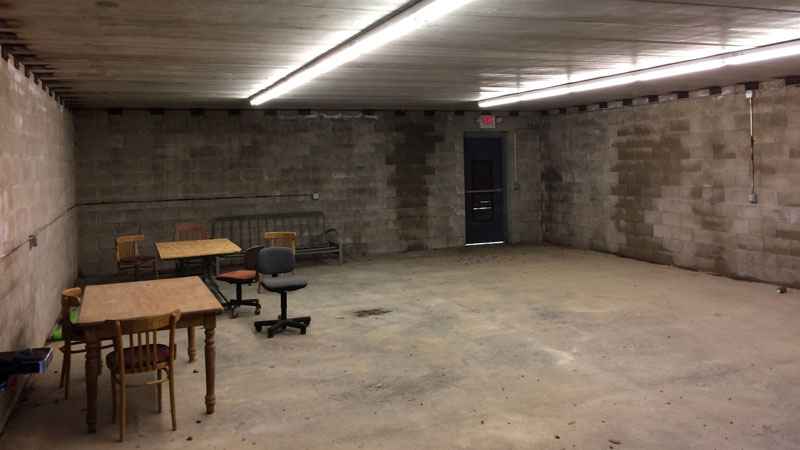Nowhere to Hide: Despite State Law, Mobile Home Residents Often Left Unprotected
A unique and decades-old law in Minnesota that requires mobile home parks to offer storm shelters or evacuation plans for residents is often not taken seriously and is rarely enforced, a 5 EYEWITNESS NEWS investigation shows.
Minnesota is the only state in the country with a law like it on the books. It requires mobile home parks built after 1988 to have an adequate storm shelter.
Older parks still must have an evacuation plan — approved by the local municipality — for residents to seek shelter off site in the event of severe weather.
{RELATEDSTORIESRIGHT}
Despite the law, people living in many of the state’s mobile home parks often have nowhere to hide.

A shelter that is not in compliance with state law.[KSTP/Ryan Raiche]
NOWHERE TO HIDE
5 EYEWITNESS NEWS reviewed thousands of pages of mobile home inspection reports from across the state.
The investigation found at least 60 violations relating to storm shelters, the lack of shelters or the lack of an approved plan for the residents who live there.
Sharon Weber lives across the street from the storm shelter at Pine Ridge Court in Becker.
If a storm hits, her plan is to ride it out in her home instead of the shelter.
“(The shelter) would be the last place I would go,” she said.
That’s because Weber says the shelter floods to the knees every time it rains.
“It just pours in here,” she said. {IMAGERIGHT}
Yet records show the state hasn’t inspected the shelter in years because it is always locked.
Records show Pine Ridge Court has violated the law every year since 2012 by locking the structure, preventing state inspections and restricting access to residents.
Weber said she is one of only two people with a key to the shelter — something experts say is a dangerous dilemma in an emergency when people need shelter fast.
The investigation found at least 15 similar violations where a park may have a storm shelter but there’s confusion about who has a key, or it’s in such a sad state people may not want to enter.
“I think there is room for laws or regulations to change,” said Steven Diaz, who is in charge of the more than 60 mobile home park inspectors in Minnesota.
A critical part of his team’s job is to protect the people who live in the more than 500 parks.
Despite the numerous violations the KSTP investigation found, Diaz and his team have only sent 17 warning letters since 2010.
“One of the things that we focus on is the fact that they are affordable housing communities,” he said.
The state has the authority to levy fines of up to $10,000 to enforce the law, but since 2010 they have only fined seven parks and collected less than $2,000.
Diaz justifies the lack of fines, saying the penalties can cripple a park and force hundreds of families out of their homes.
“The public health and public safety risk of closing a park really is in most cases greater than the risk we have with severe weather,” he said.
PLAYING THE ODDS
In other words, the state is playing the odds.
“It’s a gamble philosophy,” said Terry Stoltzman, director of Emergency Management for Anoka County. “Someday it’s going to happen.”
Stoltzman strongly believes protecting life should be a top priority.
“I think we have a system that needs to be fixed and tweaked and customized to fit the right circumstances,” he said.
Instead, park owners are still getting by with the status quo.
“There’s no plan and no place to go,” said Sandy Utke, who takes care of her 92-year-old mother at a mobile home park in Caledonia owned by the Midwest Bottle and Gas Company.
The owner of the park is businessman Jim Senty, who lives in a $1.2 million mansion in Wisconsin.
But the people who live at his park have no approved evacuation plan.
According to state records, inspectors directed Senty’s company nearly a decade ago to build a shelter or come up with an approved plan.
The park has not complied, and Senty did not respond to multiple requests for comment.
“If it’s going to wipe out a bunch of trailers and you’re in the bathroom, you might as well been sitting outside under a bush,” Utke said.
‘THEY ALL KNOW … NOT TO TAKE IT SERIOUSLY’
All Parks Alliance for Change is an advocacy group for mobile home park residents. The group successfully lobbied for Minnesota’s storm shelter law in the late-1980s.
But according to Executive Director Dave Anderson, word has spread among park owners about what they can get away with.
“They all collectively know not to take it seriously,” he said. “They’re showing no outward signs of being motivated to take any kind of action.”
5 EYEWITNESS NEWS put together a map of all the mobile home parks that had violations with storm shelters or evacuation plans in the latest inspection conducted by the state or the more than 30 delegation agencies that work with the state.
We reached out to the state and the delegation agencies to find out the status of each violation. The responses we received are included at the end of each description.
View MHP Storm Shelters in a full screen map